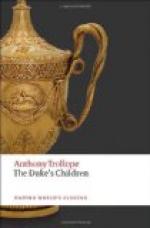The should-be lover immediately reverted to the Austrian tour, expressing a hope that his neighbour enjoyed herself. ’There’s nothing I like so much myself,’ said he, remembering some of the Duke’s words, ’as mountains, cities, salt mines, and all that kind of thing. There’s such a lot of interest about it.’
‘Did you ever see a salt mine?’
’Well;—not exactly a salt mine; but I have coal mines on my property in Staffordshire. I’m very fond of coal. I hope you like coal.’
‘I like salt a great deal better—to look at.’
’But which do you think pays best? I don’t mind telling you,— though it’s a kind of thing I never talk about to strangers,—the royalties from the Blogownie and Toodlem mines go up regularly two thousand pounds every year.’
‘I thought we were talking about what was pretty to look at.’
’So we were. I’m as fond of pretty things as anybody. Do you know Reginald Dobbes?’
‘No, I don’t. Is he pretty?’
’He used to be so angry with Silverbridge, because Silverbridge would say Crummie-Toddie was ugly.’
‘Was Crummie-Toddie ugly?’
‘Just a plain house on a moor.’
‘That sound ugly.’
‘I suppose your family likes pretty things.’
‘I hope so.’
‘I do, I know.’ Lord Popplecourt endeavoured to look as though he intended to understand that she was the pretty thing which he most particularly liked. She partly conceived his meaning, and was disgusted accordingly. On the other side of her sat Mr Boncassen, to whom she had been introduced in the drawing-room,—and who had said a few words to her about some Norwegian poet. She turned round to him, and asked him some questions about Skald, and so, getting into conversation with him, managed to turn her shoulder to her suitor. On the other side of him sat Lady Rosina De Courcy, to whom, as being an old woman and an old maid, he felt very little inclined to be courteous. She said a word, asking him whether he did not think the weather was treacherous. He answered her very curtly, and sat bolt upright, looking forward on the table, and taking his dinner as it came to him. He had been put there in order that Lady Mary Palliser might talk to him, and he regarded interference on the part of that old American as being ungentlemanlike. But the old American disregarded him, and went on with his quotations from the Scandinavian bard. But Mr Boncassen sat next to Lady Cantrip, and when at last he was called upon to give his ear to the countess, Lady Mary was again vacant for Popplecourt’s attentions. ‘Are you very fond of poetry?’ he asked.
‘Very fond.’
‘So am I. Which do you like best, Tennyson or Shakespeare?’
‘They are very unlike.’
’Yes;—they are unlike. Or Moore’s Melodies. I am very fond of “When in death I shall calm recline”. I think this equal to anything. I think Reginald Dobbes would have it as all bosh.’




